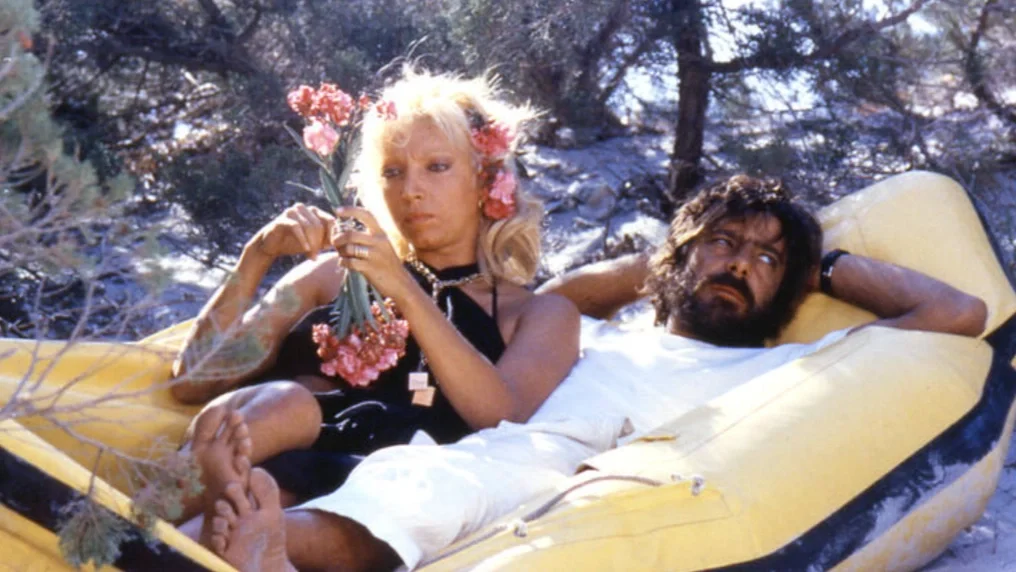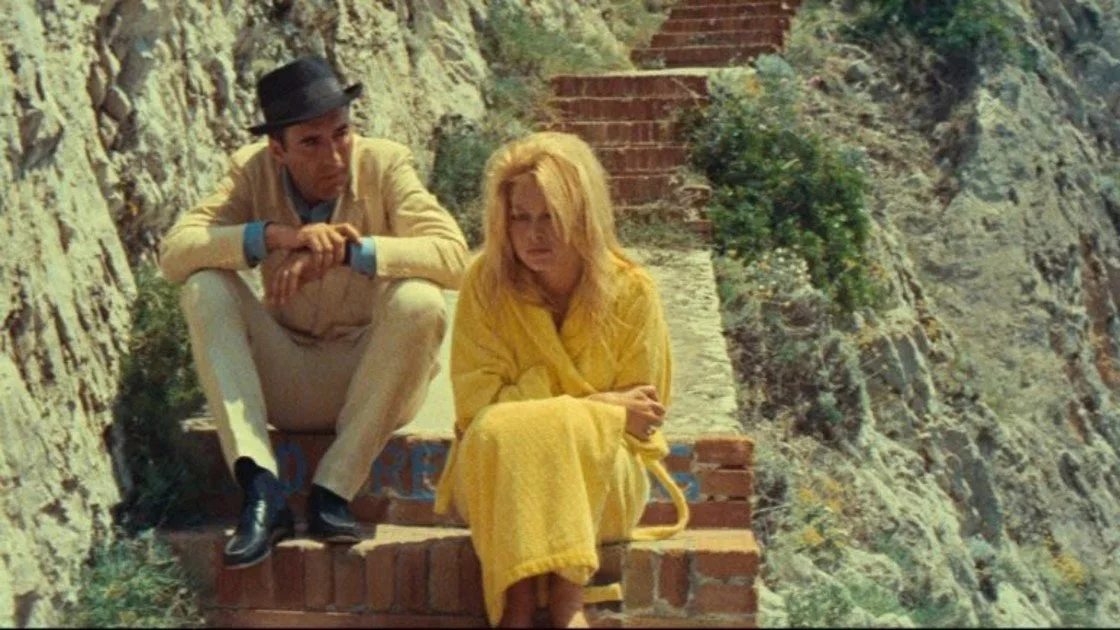Romance Turns With the Tides at AFS' Club Med Series
On the shores of Club Med, the possibilities of love are as endless as the sea itself. In the first two films of the series, Jacques Demy’s The Bay of Angels and Joseph Losey’s Boom!, the Mediterranean Sea brought lovers together in the presence of inevitable death and addiction. Despite such tragedy in their wake, the couples fought for each other and love conquered all for better or for worse. In the second two films of the series, Lina Wertmüller’s Swept Away and Jean-Luc Godard’s Contempt, we see love’s demise as irreconcilable differences surface in the tumultuous throes of passion.
If Jeanne Moreau and Claude Mann could stay together as their gambling addictions destroyed their life, if Liz Taylor and Richard Burton could pursue love in the face of inevitable death, what could destroy love in the next two films? It is the cracks in the moral framework of the men, Swept Away’s Gennarino and Contempt’s Paul, and their willingness to abandon their ideals in the pursuit of selfish satisfaction that ends these relationships. In these two films, with their pronounced political ideology, two men cross a line that their lovers refuse to follow.
Swept Away
In Swept Away, we are introduced to Raffaeila and Gennarino, employer and employee respectively, on a luxury yacht in the Mediterranean Sea. Raffaella is a staunch capitalist, spending her days mocking her friends and her yacht crew for their whimsical ideas of a better tomorrow. Gennarino is one of her cabin employees serving her and her friends and a committed communist, muttering monologues of hatred towards the upper-class folks he has to serve all day, with special vitriol for the obnoxious Raffaella.
On a motorboat expedition with only Raffaella and Gennarino, the boat malfunctions and they wash ashore on a desert island. Once they set foot on land, the island serves as a blank slate for the castaways. With no social dynamics and hierarchies to follow and a severe resentment towards one another, Gennarino drops the put-on respect for authority and leaves Raffaella to fend for herself. With his scrappy background, Gennarino can survive while Raffaella cannot, and when she demands he help her stay alive, he only accepts under the condition that she serve him unconditionally. Gennarino steps into the role of oppressor and punishes Raffaella with a series of anti-social and anti-human acts of emotional and physical violence and an unsettling romance blossoms as Raffaella begins to fall for him as a result.
Gennarino finds himself attached to this domineering relationship with Raffaella as he embodies the role of oppressor. As a result, Raffaella enters a state of Stockholm syndrome as she comes to desire the new Gennarino and his random bouts of affection and abuse. They adore their new situation and fantasize about staying on the island forever, but they both feel compelled to head back home when a luxury yacht is spotted looking for them. When the two are saved, Gennarino realizes he must return to his underclass life where he is demeaned and dehumanized by the upper-class and their relationship will never work. In secret, Gennarino plans with Raffaella to take her husband’s helicopter to the island and live out their fantasy. Raffaella shares his desire, but before they can meet up at the rendezvous point, Raffaella leaves on the helicopter with her husband, and as Gennarino runs after the helicopter, he pledges his love to her in front of his wife and the entire working-class coastal community, outing himself as a lover of Raffaella and exposing his inner capitalist.
Throughout the film, Wertmüller emphasizes that the political outlook of these characters defines who they are as people. After Raffaella has experienced the traumatic Stockholm Syndrome love affair with Gennarino, she returns from the island with an understanding of the conditions that created that time in her life, and she would not dare willingly recreate those conditions. Her life at home is too valuable and her position in the world, and her belief in it, is too strong. Even in the pursuit of love, Raffaella knows who she is: a person more committed to the life she has built upon the foundation of her capitalist beliefs than the love she has found with someone she sees as beneath her.
Gennarino, on the other hand, has discovered a side of himself that wishes to oppress. When the opportunity to dominate someone comes about, he jumps at the chance, even when his firebrand communist ideals would suggest he treat Raffaella as an equal on the island. Gennarino conflates this love of sociopolitical power with the relationship that develops on the island, and he obsesses over it to the point that he cannot abandon the chance to dominate her once again, no matter what ideals he once held. Coming back to society, Gennarino’s willingness to throw away his marriage and his comrades to wield the power of the oppressor on the island exposes himself as the monster he always preached against.
Contempt
In Contempt, director Jean-Luc Godard shows us the final days of the marriage of playwright Paul and his wife Camille as their life is turned upside-down by the offer of a lifetime. Mr. Prokosch, a Hollywood producer, has flown to Rome with a contract for Paul to rewrite the script for Fritz Lang’s adaptation of The Odyssey. When Paul accepts the deal, the lecherous Mr. Prokosch, excited to have Camille around, flirts with possibly intruding into their marriage. However, it is not the producer’s advances that lead to the end of their marriage, but rather Paul’s sudden shift in behavior after accepting the offer.
From the very beginning of the film, Paul and Camille’s relationship is defined by its obsessive qualities. Paul declares his love for every part of his wife and his willingness to suffer through life as long as it means she is by his side. When Paul is not expounding on his political ideals and his cultural opposition to “going Hollywood,” his wife is the center of his world. When given the offer by Mr. Prokosch, Paul resists at first, but he eventually accepts it for the money and the opportunity to work with Fritz Lang. To celebrate, Mr. Prokosch asks everyone to meet him at his villa, with a special request that Camilla ride with him in his two-seat convertible, and though she asks Paul to decline on her behalf, he, shockingly, accepts his new employer’s request.
As a result, Paul and Camille’s understanding of one another is destroyed. The intimacy showcased at the beginning is non-existent throughout the rest of the film. While Paul sees accepting his new boss’s request for a private joyride with Camille as an act of mutual trust, Camille views this as an irreparable crack in the closeness they have built together. She believes that, since signing the contract with Mr. Prokosch, Paul’s loyalty belongs to whoever can buy it from him. Paul would even allow his new boss to have alone time with his wife.
The rest of the film follows Paul’s blind search for the reason behind Camille’s sudden coldness towards him and Camille’s inability to convey to him why his decision hurt her so much.
While Paul tries to figure out what happened between him and his wife, his actions seem to reflect bigger and bigger changes in himself as this rift in their relationship gets larger. He hits on and gropes one of Mr. Prokosch’s female employees, he spends more and more time away from Camille, preferring the company of Fritz Lang and his film crew, and starts to distrust her entirely, accusing her of adultery. When Camille tries to explain that it was the car ride that changed her view of him, Paul refuses to accept this and tells her to run off with her new lover. Mr. Prokosch drives off with Paul’s ex-wife, and on their way home, the new couple are killed in a car accident.
The choice Paul makes after accepting the money from Hollywood might seem small, but it shows a foundational shift of his values. Camille trusted Paul to put her interest, her love, over his new boss’s and Paul blindly ignored this. For a man who waxes poetic about his anti-Hollywood ideology, a single check has a profound effect on his life. When the opportunity to profit enters Paul’s life, anything is on the table.
In this half of AFS Cinema’s Club Med series, we see men abandoning their values in the face of attractive circumstances. Both Paul and Gennarino recite vicious screeds against capitalist (or Hollywood) ideology, but they welcome that worldview into their hearts as new conditions benefit them. The influence of money and power can cause one to turn away from injustice, and putting your pocket book and your social status above all else can have severe consequences. The world you love might crumble around you, and the things in life you forget to value might disappear. One day you're in a beachside condo at Club Med and the next day you're wrecked along its rocky shores.
If you enjoyed this article, please consider becoming a patron of Hyperreal Film Journal for as low as $3 a month!





This is Dylan Samuel. If you see him, say “hello.”